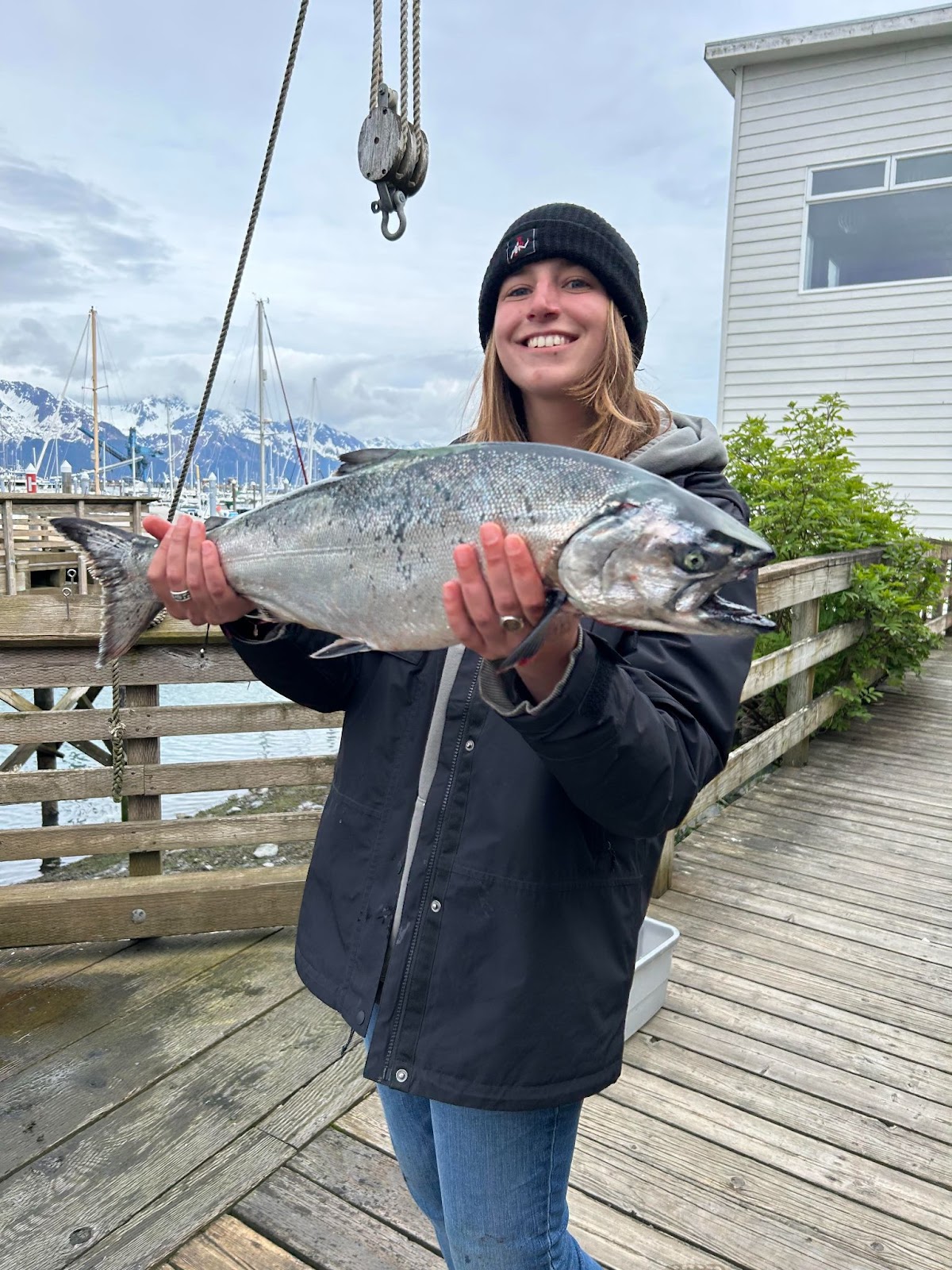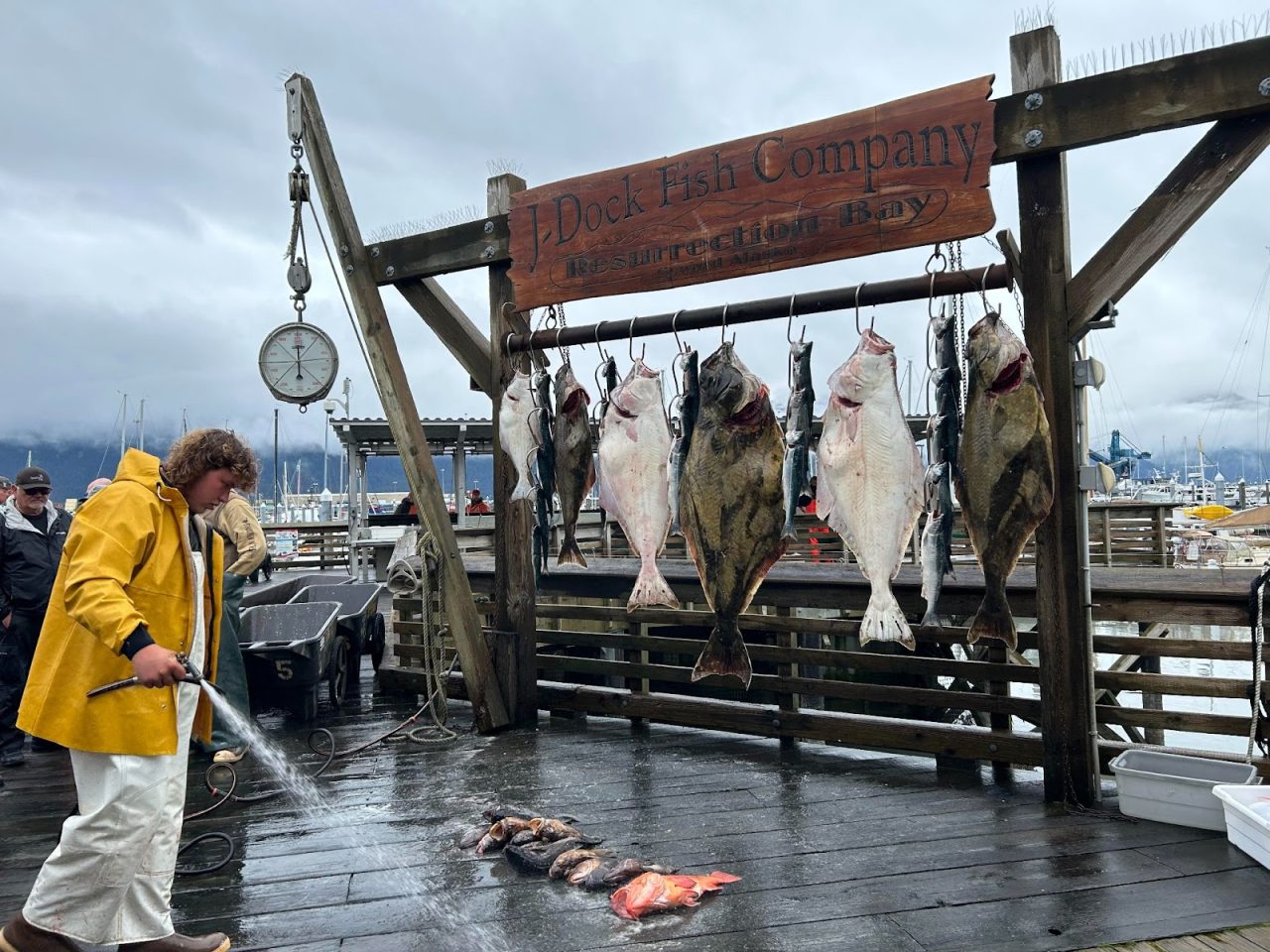
I am on the bow of a sport fishing boat off the coast of Montague Island, the second-largest unpopulated island in the US. The Gulf of Alaska is a steely gray that reflects the gathering clouds over the sun like an oily puddle. It is the first slightly sunny day in weeks, and we begin cracking Coors Lites. It’s 9am, but that doesn’t matter when the sun barely sets—except for its quick nap behind the mountains. Fishing rods (jigs) hang off the side as the two young deckhands bounce between each, checking the bait and heckling each other as the boat sways. Gulls race close to the water, flitting skillfully between the hulking mass of snow capped mountains rising from the ocean; as wondrous and eerie as the rising monuments of Stonehenge from soft English grass. We are on the edge of the earth, you can feel it as you turn from the inlet into the vast horizon of the sea. The spiritual quietness that has settled between us on the boat begins to kick up like dust rising from the traveled road as the fish begin biting. Suddenly it’s all hands-on deck, the men are running around shouting in gravelly voices “Fish on! Fish on! You got one there, pull er’ up! Nice and slow now NICE AND SLOW!” There is mayhem from all sides of the vessel, King Salmon is being flung onto the deck as we maneuver around their flopping flailing scales to reel up more lines. The deck hands are softly bludgeoning them with round clubs, blood swishes around the bottom deck and squirts out of the fish hold, where they are thrown once clubbed and, if still alive, left to thump around inside the box.
We are no longer sightseers, wilderness explorers, but bloodthirsty heathens dipping lines into the great Alaskan Gulf. It is purely animal. We gather around one girl, Emilee, as her jig bends almost behind the stern. Through the clouds the sun beats hot on our heads. “YOU GOT ER’, YOU GOT ER’, KEEP REELING!” The bearded captain shouts as he rushes around the back deck preparing for the catch. A mulleted 19 year-old deckhand grabs a huge net in preparation as she reels the monster closer to its death. A hulking, thrashing white and green shadow becomes clear underneath the green water. Emilee struggles with the final few turns of the reel, the deckhand throws the huge net in the water to separate the beast from its murky home. His gigantic, squirming body is thrown on the deck as we all rush back to the bow so that its frantic body doesn’t break our legs. It is a 200 pound Halibut. The body on the Halibut is like a flounder, wide and lengthy until it dips into a small and powerful tail. The thing fights against the confines of the stern, its white underbelly marred in blood; lips the size of sausages and rimmed with a neat row of pointy teeth close underneath the gaze of its blank eyes. Its gills, the size of a saucer, open and close futility, exposing a rim of red capillaries. We stand panting and exalted as it’s bludgeoned and stuffed into the hold.
This is sport fishing in Alaska, this is what is called “catchin’ a Hawg.”

This native Narragansetteer has relocated themselves to the last frontier of Seward, Alaska for the summer. It is true that there is life on the other side of the towers, but I am sad to report that there are no Dunkin Donuts. Clam cakes? Out. King crab legs? Definitely in.
Life here is sort of incredible, I have only been here a week and there is already a neighborhood moose (named Goop) that has petitioned itself outside of my van door nightly. I introduced myself to him on my first run in the neighborhood, an early morning jog by the salmon creek that roars hungrily from the mountains into the bay. He was having an early morning drink, his beautiful hulking brown body dipped gracefully into the clear blue water. When he noticed my observation, he turned his large ancient skull towards me in recognition before picking up his hooves and fading quickly into the underbrush. In the pre-Alaskan dawn of the midnight sun, it was hard to imagine such a mythical creature was even there at all.
As I summited Sewards famous mountain, Mt. Marathon, I got the chance to go sledding in June. When I reached the top of the 4,000 footer, after digging and sweating my way through a steep slope of untouched snow, I was rewarded with the wild landscape of the Marathon Bowl; a carved inlet in the mountains which was cupped by sharp peaks reaching into the foggy abyss of the sky. It is hard for the eye to rightfully discern such majesty; I wish I could say I thought the same when gazing upon the hill of Exeter’s Yawgoo Valley. But what I did next was very Yawgoonian of me, if you know the Yawgoons as the snowboarding group of Rhode Island, you know they’re always pulling weird stunts with whatever they can fashion. And that’s just how us Rhode Islander’s do it, we make a lot with just a little.
Instead of crawling my way back down the snowy scape that completely covered the trail, I tied my rain jacket around my waist to fashion a makeshift sled and “Bon Voyage!” down the mountain. I was proud of my Muir-esque ingenuity, but apparently people literally bring sleds, skis, and snowboards up this mountain all the time; so I probably just looked like the biggest Gerry on Earth. “There’s that weird girl from Rhode Island, sledding down Marathon on her ass.”
Hey, even in the biggest state, I’m proud of my tiny state. Something I represent confidently when asked “What the hell is a Quahog?” and, “How’s it feel growing up on an Island?” by responding, in my thick eastern accent, “Eh, don’t worry about it!”
MaraJean Hagen-Spath is a 2023 intern at Motif who, after graduating with an English and Philosophy double major from the University of Rhode Island, decided to do what any archetypal college graduate would do — go work at a fishing dock in Seward, Alaska. As a native Narragansetter, she has always felt most at home by the sea and the industries that surround it; something she thinks is intrinsic to Rhode Island. Turns out some 3,000 miles away, on a tiny peninsula in a state that encompasses 425 Rhode Islands, there sits a fishing port just like our little Galilee, with people just like us; but with way bigger fish, and way bigger boats.

